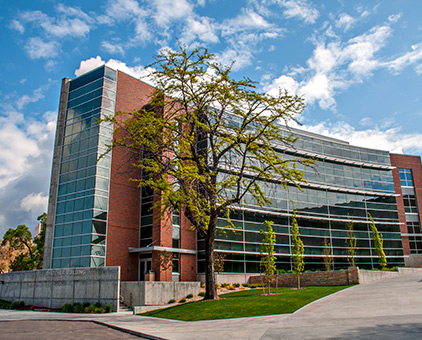Biomedical Engineering
Arts Pass
Bennion
Center
Hinckley
Institute
Learning Abroad
Office of
Undergraduate Research
Courses
Making Progress
- Meet with your advisor often to discuss your progress, options for summer course work, and the graduation path that will work best for you.
- Keep track of your own progress by using the Degree Plan Flowcharts; your advisor can make a personalized one for you!
Finishing Up
- Track completion of GE requirements, Math and Science courses, and BME requirements that can be found here
- Schedule a meeting here to review your degree audit one semester before graduation
Community
Getting Started
- Attend the Get Involved Fair and Engineering Club Rush (info fairs for students organizations on campus)
- Join the Biomedical Engineering Society (BMES) Student Chapter U of U. To join the BMES Student Chapter, please reach out to our co-chairs at utahbmes@gmail.com
Making Progress
- Build strong study groups with your peers
- Join an engineering student organization
- Attend research symposiums and other Undergraduate Student Advisory Committee events
- Check our website calendar for more events
Finishing Up
- Network with your fellow classmates; they could be your future coworkers!
- Join the Engineering Alumni Association
- Support Biomedical Engineering with a donation
Knowledge & Skills
Getting Started
- Explore tutoring resources through the Chemistry, Math, Physics, and Biology Departments or the Learning Center.
- Interview or job shadow with someone in your field of interest.
Making Progress
- Apply to work as a Teaching Assistant, Learning Assistant, and/or Stockroom Attendant to build scientific, technical and communication skills.
- Obtain a position in a research lab, internship, or receive permission to use the design class project.
- Attend the STEM Job Fair in the fall to find internships.
- Join a research team; connect with your current professors or explore faculty research areas.
Finishing Up
- Present research at national/regional scientific conferences.
- Meet with your advisor to explore technical electives and review degree audit.
Transformation
Getting Started
- Find a mentor by connecting with faculty and student leaders.
- Take a workshop through the Learning Center.
- Attend office hours to get to know your professors.
Making Progress
- Go on a Learning Abroad trip.
- Reach out to professors to engage in research experience.
- Analyze your study skills - What are you doing well to prepare? What could you do differently?
- Attend a wellness workshop or training through the Center for Student Wellness.
- Create a budget with a certified financial counselor at the Financial Wellness Center.
- Attend a workshop through the Counseling Center to develop a work-life balance.
Finishing Up
- Take an art class for non-majors
- Meet with a trusted faculty member to discuss your future plans
- Finish internships or co-op experiences
Impact
Getting Started
- Attend a Learning Abroad 101 Information Session
- Engage in service opportunities through the Bennion Center
- Live in the Kahlert Village
- Meet with a Student Success Coach
Making Progress
- Participate in an Alternative Fall or Spring Break trip through the Bennion Center
- Judge a local school's science fair
- Live in the Crocker Science House or become an RA for the Kahlert Village
- Grow your teamwork and communication skills while working in small groups with other classmates
Finishing Up
- Attend a Hinckley Forum or Frontiers of Science event offered on campus
- Use your Arts Pass to attend events on campus or visit one of the museums in Salt Lake City
Careers
Getting Started
- Start to network with Handshake, LinkedIn, Forever Utah, etc. and get familiar with various features
- Explore the Career & Professional Development Center’s website for resources and interest assessments
Making Progress
- Complete an internship or undergraduate research experience
- Update your resume and draft a cover letter
- Track all the experiences and skills you're gaining throughout your classes, labs, and co-curricular activities in a master resume
- Complete a mock interview with a Career Coach or an alumni
- Maintain connections with your networks by updating them on your progress and interests
Finishing Up
- Attend the STEM Career Fair for full-time employment
- Meet with your Career Coach to create a comprehensive job search plan
Start Your Career Journey
Find support at the Career and Professional Development Center (CPDC)
About the Major
Learning Outcomes
- Effectively communicate and solve problems at the interface of engineering and biology.
- Understand contemporary questions that link science, medicine, technology, and society.
- Understand and apply industry standards of ethical behavior.
- Be prepared for success in graduate programs, professional schools (including medicine and law), or in a biomedical aligned career.
Plan & Prepare
At the U, we plan for our students to have an exceptional Educational Experience identified by four broad categories we call the Learning Framework: Community, Knowledge & Skills, Transformation, and Impact. This major map will help you envision, explore, design, and plan your personalized Exceptional Education Experience with the Learning Framework at the core. In addition to assisting you in planning your coursework and navigating the requirements of your major, this map will help you incorporate other kinds of experiences to expand your knowledge, support your development, and prepare you for the future you want.


